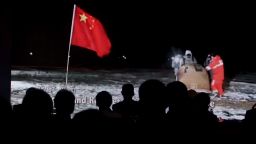World
Chinese Astronauts’ Return Delayed Due to Space Debris Concerns

A crew of three Chinese astronauts will extend their six-month mission in space due to concerns that their spacecraft may have sustained damage from space debris. Chen Dong, Chen Zhongrui, and Wang Jie were initially scheduled to return to Earth on March 6, 2024, after handing over operations of the Chinese space station to a new crew. However, the China National Space Administration (CNSA) announced the postponement following a suspected impact on their Shenzhou-20 spaceship.
The CNSA stated that “the impact analysis and risk assessment are under way,” but did not provide specific details about any potential damage or how long the assessment might take. Currently, no alternative return date has been offered for the astronauts, who launched from the Inner Mongolia Autonomous Region in April 2023.
Recent Developments in China’s Space Program
This news comes shortly after China celebrated the successful launch of Shenzhou-21, a newer spacecraft that transported a fresh group of astronauts to the Tiangong space station. Among the new crew was Wu Fei, 32, who has been highlighted by local media as potentially the youngest astronaut to reach space from China.
During the handover ceremony, state-owned CCTV showcased both crews meeting in a confined space to sign documentation on a floating board. “We are about to return to Earth, and now I am handing over the hatch key that symbolizes the right to maintain operations on this Chinese space station to you,” said Chen Dong during the ceremony.
While the astronauts await their return, the CNSA emphasized that the decision to delay was made in the interest of their safety and health. The Shenzhou program has become a source of national pride, marking significant advancements in China’s space exploration efforts. Notable achievements have included breaking the US record for the longest spacewalk, lasting nine hours, and plans to invite foreign astronauts, including one from Pakistan, to the Tiangong space station next year.
The rapid developments in China’s space ambitions have raised concerns in Washington, where officials are keenly aware of the competitive landscape in space exploration. The United States is in the process of returning astronauts to the Moon, a mission complicated by restrictions placed on Chinese citizens participating in NASA programs during the Trump administration.
Challenges in Space Missions
The situation mirrors recent challenges faced by NASA, where astronauts Suni Williams and Butch Wilmore found their mission extended beyond the planned duration. After launching in June 2022, their return was delayed for over nine months due to a malfunction in the Boeing Starliner spacecraft. Ultimately, they were transported back to Earth in a SpaceX Crew Dragon capsule in March 2023.
As the CNSA continues to assess the Shenzhou-20 spacecraft, the astronauts remain in a unique position of anticipation, embodying both the triumphs and uncertainties of modern space exploration. The outcome of this incident will likely influence future missions and the ongoing evolution of China’s space program.
-

 Top Stories1 month ago
Top Stories1 month agoRachel Campos-Duffy Exits FOX Noticias; Andrea Linares Steps In
-

 Top Stories1 week ago
Top Stories1 week agoPiper Rockelle Shatters Record with $2.3M First Day on OnlyFans
-

 Top Stories6 days ago
Top Stories6 days agoMeta’s 2026 AI Policy Sparks Outrage Over Privacy Concerns
-

 Sports5 days ago
Sports5 days agoLeon Goretzka Considers Barcelona Move as Transfer Window Approaches
-

 Top Stories1 week ago
Top Stories1 week agoUrgent Update: Denver Fire Forces Mass Evacuations, 100+ Firefighters Battling Blaze
-

 Top Stories1 week ago
Top Stories1 week agoOnlyFans Creator Lily Phillips Reconnects with Faith in Rebaptism
-

 Entertainment5 days ago
Entertainment5 days agoTom Brady Signals Disinterest in Alix Earle Over Privacy Concerns
-

 Top Stories5 days ago
Top Stories5 days agoWarnock Joins Buddhist Monks on Urgent 2,300-Mile Peace Walk
-

 Top Stories7 days ago
Top Stories7 days agoOregon Pilot and Three Niece Die in Arizona Helicopter Crash
-

 Health2 months ago
Health2 months agoTerry Bradshaw Updates Fans on Health After Absence from FOX NFL Sunday
-

 Top Stories4 days ago
Top Stories4 days agoCBS Officially Renames Yellowstone Spin-off to Marshals
-

 Sports4 days ago
Sports4 days agoSouth Carolina Faces Arkansas in Key Women’s Basketball Clash



